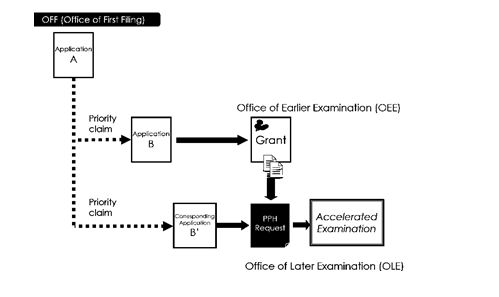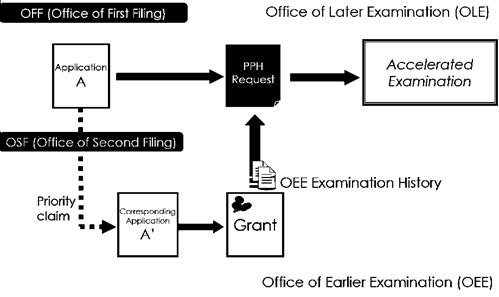- with readers working within the Pharmaceuticals & BioTech industries
- within Employment and HR, Insurance and Corporate/Commercial Law topic(s)
- with Inhouse Counsel
Patents, like other forms of intellectual property, are jurisdiction specific. In other words, you obtain protection only in those jurisdictions where you have sought protection. The application process is long, and can stretch for months, or even years on end. While the end result, if successful, can be immensely satisfying and rewarding, the prospect of having to repeat this process in other countries can be quite overwhelming. For this reason, the international patent community has come up with many methods to simplify and shorten application processes where an application is being filed in multiple countries. Applications filed under the Paris Convention and the Patent Cooperation Treaty are examples of such well-established mechanisms for simplified processes (for a description of patent application types, see: https://www.obhanandassociates.com/blog/types-of-patent-applications-in-india/). A more recent addition to this is the Patent Prosecution Highway, intended to reduce the time taken in patent prosecution in one jurisdiction, where an application has already been successfully prosecuted in another.
About the Patent Prosecution Highway
The Patent Prosecution Highway (PPH) is a programme to fast-track patent examination that benefits both applicants and patent offices. Under this, an applicant can use positive examination results from one patent office to streamline prosecution in a second patent office. Effectively, PPH enables patent offices to re-use or rely on the examination undertaken by other patent offices to efficiently process patent applications. It reduces workload and timelines for prosecution. However, the discretion to grant a patent or not remains with the patent office in which protection is sought.
For an application to be examined via the PPH route, certain minimum conditions must be met:
- The application at the Office of Earlier Examination (OEE) and the application at the Office of Later Examination (OLE) must have the same earliest date (whether this is a priority date or a filing date).
- At least one claim must have been held allowable by the OEE;
- Claims at the OLE must sufficiently correspond to one or more claims indicated as allowable/patentable in the OEE; and
- Substantive examination of the OLE application for which participation in the PPH is requested has not begun. Thus, if an applicant plans on using a PPH programme, they must ensure that a request to examine the application has not been filed at the OLE.
Currently, several PPH agreements exist between different patent offices, including most major ones. For an Indian applicant too, many options are available, which this note attempts to summarise.
- Bilateral PPHs Programme
A Bilateral PPH programme is a collaborative agreement between two patent offices where the positive examination result of one patent office can be used by the other patent office. Indian Patent Office (IPO) is currently a part of a bilateral PPH pilot programme with Japan.
IPO-JPO PPH Pilot Programme
India's first PPH programme was introduced in 2019 in collaboration between the IPO and the Japan Patent Office (JPO). As the name suggests, this is a pilot programme intended to run for three years, and is limited to 100 patent applications originating from each patent office. The pilot commenced on 5 December 2019 and will conclude later this year.
The IPO-JPO PPH Pilot is accessible only to applicants that have filed their first application in either India or Japan. It cannot be availed where the first application was filed in a third country, and then brought into either India and Japan via the Paris Convention or the PCT Route. The processes for applying in either office vary slightly, as described below.
a. The IPO process
An applicant can file for a PPH request in India once the IPO notifies that it is accepting such requests. Currently, only 100 requests are permitted for a given year, with a further limitation of 10 PPH requests by each applicant per year, either alone or jointly.
Significantly, not all subject matters are covered under this programme in India (this is not the case in Japan – see below). The IPO accepts PPH requests only for applications pertaining to Electrical Engineering, Electronics, Computer Science, Information Technology, Physics, Civil Engineering, Mechanical Engineering, Textiles, Automobiles and Metallurgy. Applications related to Chemistry, Pharmaceuticals, and Biotechnology are not eligible.
PPH requests are to be filed, within 48 months of the date of priority or the date of filing of the application, whichever is earlier. The fees for filing such requests are about INR 40,000 to 60,000 (~USD 500-750) for a large entity.
While filing a PPH request, copies of all office actions issued by the JPO, claims determined to be patentable/allowable by the JPO along with translations, references cited by the JPO and the claim correspondence table in Form 5-1, must be submitted.
b. The JPO process
Unlike the IPO, the JPO accepts applications in all fields of technology. There is also no limit on the maximum number of applications from a single applicant in a given year. Copies of documents need not be submitted either, if these are available on the IPO website. Only when documents cannot be accessed, the JPO examiner may ask the applicant to submit the documents. Applicants must, however, submit claim correspondence tables. There is also no additional fee for filing a PPH request at the JPO.
- Global PPH
A Global PPH programme is a collaborative agreement between multiple patent offices where the examination result of one patent office can be used by the other patent offices. Although, the IPO is currently not a part of Global PPH programme, nevertheless, Indian applicants can avail the benefit of Global PPH programme when filing applications in other jurisdictions. The GPPH is a plurilateral PPH pilot programme covering 3 types of PPH. The GPPH makes the bilateral PPH, the PPH MOTTAINAI and the PCT-PPH available between any two participating offices. The GPPH includes 27 patent offices, including the USPTO, JPO, KIPO, but excluding the EPO or CNIPA. Under the GPPH, a request for accelerated processing can be made at any participating office based on the results of the national examination or based on a PCT work product from any participating patent office.
a. PCT-PPH
Indian applicants can seek accelerated examination in certain jurisdictions with which the IPO has not signed PPH agreements through the PCT-PPH route. For this, an Indian applicant must file an international application with the International Bureau (IB) of the WIPO as the receiving office and select member states of the Global PPH or IP5 PPH as the International Searching Authority (ISA) or the International Preliminary Examination Authority (IPEA). PCT-PPH allows applicants to use either a positive written opinion of the ISA or a positive International preliminary Examination Report (IPER) of the IPEA (filed under chapter II of the PCT), issued within the PCT framework to apply for accelerated examination in the office of a member state. Since, the accelerated examination can be filed on the IPER, even if the written opinion of the ISA, is not positive, the Applicant can make amendments to the International Application and file a chapter II demand at the IPEA, that will then issue an opinion on the amended application. In case the IPEA issues a favourable opinion in the form of a positive IPEA, this IPEA can be used to accelerate the prosecution.
However, the applicant must keep in mind that the PCT-PPH cannot be used for applications that are filed at the European Patent Office or the Chinese Patent Office where the ISA or IPEA is issued by the same office respectively.
b. IP5 PPH
The IP5 PPH is an agreement between the United States Patents and Trademark Office (USPTO), European Patent Office (EPO), Japan Patent Office (JPO), Korean Patent Office (KIPO), and China National Intellectual Property Administration (CNIPA). Still in pilot stage, the IP5 PPH will continue till January 2023. Under this programme, a PPH request can be based either on the latest PCT, written opinion of the ISR, IPER issued by one of the IP5 offices or on the examination report issued by the patent office of the member country. Thus, where the Indian Applicant has received either positive written opinion of the ISR, or a positive IPER where the IPEA is one of the above-mentioned member offices or a positive examination report from any of the member patent offices, then the Indian Applicant may use said positive report to apply for PPH request in any of the other member offices.
c. MOTTAINAI-agreement
PPH MOTTAINAI is a simpler PPH-agreement that came into effect from July 15, 2011, and has been signed by JPO (Japan), USPTO (USA), UK-IPO (UK), CIPO (Canada), IP Australia (Australia), NBPR (Finland), ROSPATENT (Russia) and SPTO (Spain). Under the PPH MOTTAINAI program, the original priority application, from which a patent family stems, may now originate from any country. Thus, where the first priority application is filed in India, and corresponding application claiming priority from the Indian application are filed in any of the signatory countries, and a grant is obtained in a signatory country. Then the grant can be used to file a request under PPH programme to accelerate prosecution in any other signatory country. A flowchart explaining the same is provided below:

Additionally, this agreement allows the use of a decision to grant originating from any of the participating offices to request prosecution under the PPH at any other one of the participating offices, provided a mutual PPH-agreement exists and remaining requirements are met within one patent family. A flowchart explaining the same is provided below:

Thus, the PPH MOTTAINAI program allows the Indian Applicants to take advantage of the PPH-agreements between the participating countries, for applications that are first filed in India. In conclusion, an applicant can make a PPH request in any other country, if there is a bilateral agreement between the countries.
Conclusion
PPH programmes are still in pilot stage, and data is still being collected regarding the working of these programmes. As awareness about these programmes increases, more applicants are accessing these routes. With across-the-board benefits for applicants and patent offices alike, whether in terms of prosecution time, costs, workload, standardisation of rights available across jurisdictions, or overall efficiency, these programmes are only likely to get more popular. It is hoped that these pilots will convert to fully entrenched programmes that can enable patent rights and protections to be streamlined globally, which is arguably desperately needed in a global marketplace.
The content of this article is intended to provide a general guide to the subject matter. Specialist advice should be sought about your specific circumstances.
[View Source]



